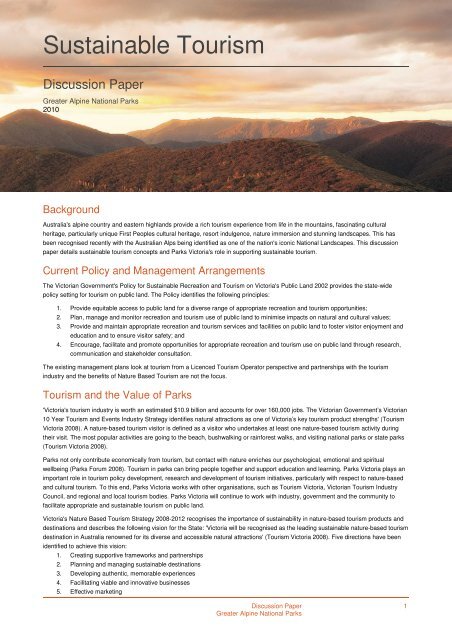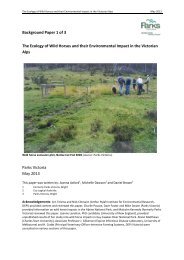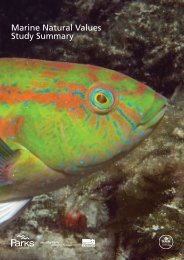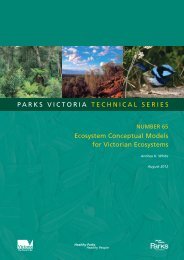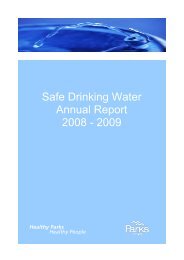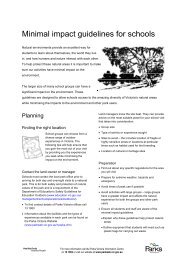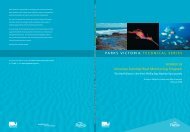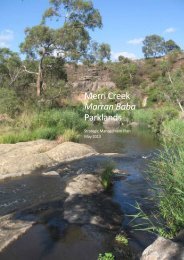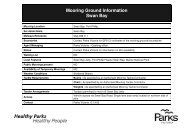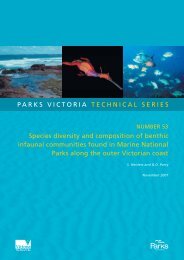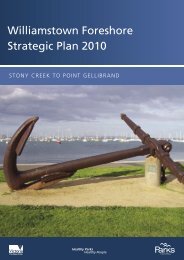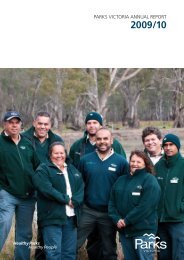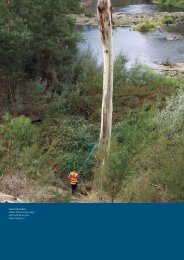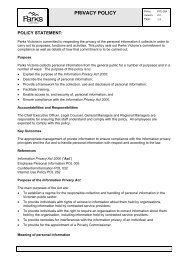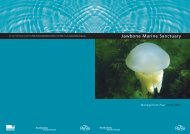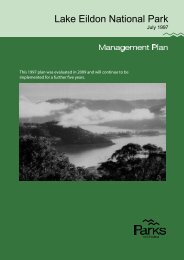Sustainable Tourism Discussion Paper (and ... - Parks Victoria
Sustainable Tourism Discussion Paper (and ... - Parks Victoria
Sustainable Tourism Discussion Paper (and ... - Parks Victoria
You also want an ePaper? Increase the reach of your titles
YUMPU automatically turns print PDFs into web optimized ePapers that Google loves.
<strong>Sustainable</strong> <strong>Tourism</strong><br />
<strong>Discussion</strong> <strong>Paper</strong><br />
Greater Alpine National <strong>Parks</strong><br />
2010<br />
Background<br />
Australia's alpine country <strong>and</strong> eastern highl<strong>and</strong>s provide a rich tourism experience from life in the mountains, fascinating cultural<br />
heritage, particularly unique First Peoples cultural heritage, resort indulgence, nature immersion <strong>and</strong> stunning l<strong>and</strong>scapes. This has<br />
been recognised recently with the Australian Alps being identified as one of the nation's iconic National L<strong>and</strong>scapes. This discussion<br />
paper details sustainable tourism concepts <strong>and</strong> <strong>Parks</strong> <strong>Victoria</strong>'s role in supporting sustainable tourism.<br />
Current Policy <strong>and</strong> Management Arrangements<br />
The <strong>Victoria</strong>n Government's Policy for <strong>Sustainable</strong> Recreation <strong>and</strong> <strong>Tourism</strong> on <strong>Victoria</strong>'s Public L<strong>and</strong> 2002 provides the state-wide<br />
policy setting for tourism on public l<strong>and</strong>. The Policy identifies the following principles:<br />
1. Provide equitable access to public l<strong>and</strong> for a diverse range of appropriate recreation <strong>and</strong> tourism opportunities;<br />
2. Plan, manage <strong>and</strong> monitor recreation <strong>and</strong> tourism use of public l<strong>and</strong> to minimise impacts on natural <strong>and</strong> cultural values;<br />
3. Provide <strong>and</strong> maintain appropriate recreation <strong>and</strong> tourism services <strong>and</strong> facilities on public l<strong>and</strong> to foster visitor enjoyment <strong>and</strong><br />
education <strong>and</strong> to ensure visitor safety; <strong>and</strong><br />
4. Encourage, facilitate <strong>and</strong> promote opportunities for appropriate recreation <strong>and</strong> tourism use on public l<strong>and</strong> through research,<br />
communication <strong>and</strong> stakeholder consultation.<br />
The existing management plans look at tourism from a Licenced <strong>Tourism</strong> Operator perspective <strong>and</strong> partnerships with the tourism<br />
industry <strong>and</strong> the benefits of Nature Based <strong>Tourism</strong> are not the focus.<br />
<strong>Tourism</strong> <strong>and</strong> the Value of <strong>Parks</strong><br />
'<strong>Victoria</strong>'s tourism industry is worth an estimated $10.9 billion <strong>and</strong> accounts for over 160,000 jobs. The <strong>Victoria</strong>n Government’s <strong>Victoria</strong>n<br />
10 Year <strong>Tourism</strong> <strong>and</strong> Events Industry Strategy identifies natural attractions as one of <strong>Victoria</strong>’s key tourism product strengths' (<strong>Tourism</strong><br />
<strong>Victoria</strong> 2008). A nature-based tourism visitor is defined as a visitor who undertakes at least one nature-based tourism activity during<br />
their visit. The most popular activities are going to the beach, bushwalking or rainforest walks, <strong>and</strong> visiting national parks or state parks<br />
(<strong>Tourism</strong> <strong>Victoria</strong> 2008).<br />
<strong>Parks</strong> not only contribute economically from tourism, but contact with nature enriches our psychological, emotional <strong>and</strong> spiritual<br />
wellbeing (<strong>Parks</strong> Forum 2008). <strong>Tourism</strong> in parks can bring people together <strong>and</strong> support education <strong>and</strong> learning. <strong>Parks</strong> <strong>Victoria</strong> plays an<br />
important role in tourism policy development, research <strong>and</strong> development of tourism initiatives, particularly with respect to nature-based<br />
<strong>and</strong> cultural tourism. To this end, <strong>Parks</strong> <strong>Victoria</strong> works with other organisations, such as <strong>Tourism</strong> <strong>Victoria</strong>, <strong>Victoria</strong>n <strong>Tourism</strong> Industry<br />
Council, <strong>and</strong> regional <strong>and</strong> local tourism bodies. <strong>Parks</strong> <strong>Victoria</strong> will continue to work with industry, government <strong>and</strong> the community to<br />
facilitate appropriate <strong>and</strong> sustainable tourism on public l<strong>and</strong>.<br />
<strong>Victoria</strong>'s Nature Based <strong>Tourism</strong> Strategy 2008-2012 recognises the importance of sustainability in nature-based tourism products <strong>and</strong><br />
destinations <strong>and</strong> describes the following vision for the State: '<strong>Victoria</strong> will be recognised as the leading sustainable nature-based tourism<br />
destination in Australia renowned for its diverse <strong>and</strong> accessible natural attractions' (<strong>Tourism</strong> <strong>Victoria</strong> 2008). Five directions have been<br />
identified to achieve this vision:<br />
1. Creating supportive frameworks <strong>and</strong> partnerships<br />
2. Planning <strong>and</strong> managing sustainable destinations<br />
3. Developing authentic, memorable experiences<br />
4. Facilitating viable <strong>and</strong> innovative businesses<br />
5. Effective marketing<br />
<strong>Discussion</strong> <strong>Paper</strong><br />
Greater Alpine National <strong>Parks</strong><br />
1
Climate Change <strong>and</strong> <strong>Tourism</strong><br />
Climate change is likely to cause reductions in snow cover, increased risks of wildfires <strong>and</strong> invasion of weeds <strong>and</strong> other pests<br />
(Government of Australia Department of Climate Change 2008). <strong>Victoria</strong>'s Nature Based <strong>Tourism</strong> Strategy 2008-2012 states that<br />
'climate change is anticipated to have profound implications that could fundamentally transform aspects of the tourism sector both here<br />
in <strong>Victoria</strong> <strong>and</strong> in other parts of the world' (<strong>Tourism</strong> <strong>Victoria</strong> 2008). Climate change for the tourism sector can represent an opportunity;<br />
visitors are 'now seeking experiences <strong>and</strong> destinations that are actively reducing their impacts on climate change <strong>and</strong> the size of their<br />
carbon footprint' (<strong>Tourism</strong> <strong>Victoria</strong> 2008). This aligns with <strong>Parks</strong> <strong>Victoria</strong> Visitor Segmentation research showing that Trail User <strong>and</strong><br />
Access Made Easy comprise the bulk of visitors to the area.<br />
For the Greater Alpine National <strong>Parks</strong> reduced snow cover is likely to affect winter snow based recreation at Dingo Dell <strong>and</strong> Cresta<br />
Valley at Mount Buffalo <strong>and</strong> St Gwinear at Baw Baw National Park. Increased risks of wildfires may also reduce the number of days that<br />
the Greater Alpine National <strong>Parks</strong> are closed to the public.<br />
Climate change may on the other h<strong>and</strong> mean that the winter closure period for much of the park’s operational road network can be<br />
shortened <strong>and</strong> visitors may be able to have greater access to areas that become drier.<br />
<strong>Parks</strong> <strong>Victoria</strong>'s Role in <strong>Sustainable</strong> <strong>Tourism</strong><br />
<strong>Parks</strong> play an important role in tourism, creating significant benefits for businesses <strong>and</strong> communities <strong>and</strong> contributing around $960<br />
million annually to the state economy. <strong>Tourism</strong> activities within parks take a number of forms:<br />
• facilities <strong>and</strong> activities <strong>Parks</strong> <strong>Victoria</strong> manages directly;<br />
• facilities <strong>and</strong> activities managed by a third party under a lease;<br />
• activities that are managed under permit or licence; <strong>and</strong><br />
• other commercial partnerships.<br />
Facilities <strong>and</strong> activities that <strong>Parks</strong> <strong>Victoria</strong> manages directly Camping areas, hiking trails, roads <strong>and</strong> tracks, lookouts <strong>and</strong> the scenic<br />
features of our parks draw visitors <strong>and</strong> are therefore an important part of <strong>Parks</strong> <strong>Victoria</strong>'s role in tourism.<br />
Activities that are managed under permit <strong>and</strong> licence <strong>Parks</strong> create significant benefits for individual businesses, in particular for<br />
<strong>Victoria</strong>’s 300 licensed tour operators. <strong>Parks</strong> <strong>Victoria</strong> issues permits <strong>and</strong> licences to allow a company to trade within a park. Examples of<br />
such trade are to offer an activity within a park (such as horse riding, angling, four wheel driving, abseiling or canoeing), or to operate a<br />
ski-hire business or food van service. The <strong>Victoria</strong>n Government's Policy for <strong>Sustainable</strong> Recreation <strong>and</strong> <strong>Tourism</strong> on <strong>Victoria</strong>'s Public<br />
L<strong>and</strong> 2002 provides some direction for licensed tour operations, stating that: 'Commercial recreation <strong>and</strong> tourism trade or business<br />
purposes will continue to require the express written consent (licence) of the relevant l<strong>and</strong> management authority... Access to public<br />
l<strong>and</strong> for the public will continue to generally be as of right; except where limited by statute, management plan or other management<br />
reason. General public access or specific activities may be restricted at certain sites for reasons such as protection of natural <strong>and</strong><br />
cultural values, visitor safety <strong>and</strong> user conflicts.' (DSE 2002)<br />
Permits include a range of conditions to ensure the activities are compatible with park management objectives. Some activities have<br />
been considered inappropriate for a commercial tour in the parks, including guided deer hunting <strong>and</strong> hunting outfitters. Licensed tour<br />
operators play a significant role in providing access to parks <strong>and</strong> educating visitors about their values <strong>and</strong> appropriate use. Visitors who<br />
may not normally be able to experience the parks’ features or undertake specific activities because of lack of suitable equipment,<br />
transport or experience, can do so on commercial tours.<br />
Recreational activities undertaken by clubs, volunteers, educational institutions <strong>and</strong> other organised groups which are not conducted as<br />
a commercial service do not require a licence.<br />
Other commercial partnerships Several <strong>Parks</strong> <strong>Victoria</strong> facilities across the state are managed under a commercial lease arrangement.<br />
The Mount Buffalo Chalet is an example of such an arrangement within the planning area. Generally, a business will apply for a lease<br />
through a tender process following a call for expressions of interest. Leases aim at ensuring that park values are protected <strong>and</strong> that the<br />
services provided to park visitors are appropriate.<br />
In some cases, <strong>Parks</strong> <strong>Victoria</strong> undertakes Public, Private Partnerships (PPP) which facilitates public <strong>and</strong> private sector investment in the<br />
establishment <strong>and</strong> ongoing management of tourism infrastructure. Although there are no current examples of this model within the<br />
planning area there are potential opportunities for this investment model.<br />
Aboriginal <strong>Tourism</strong><br />
<strong>Parks</strong> provide either the site or the setting for the majority of <strong>Victoria</strong>’s opportunities for nature <strong>and</strong> Aboriginal cultural-based tourism <strong>and</strong><br />
recreational activities. Aboriginal <strong>Tourism</strong> is the fastest growing sector of Australia's tourism market <strong>and</strong> the Alps <strong>and</strong> <strong>Parks</strong> provide very<br />
good potential for quality <strong>and</strong> unique tourism opportunities by First Peoples or Traditional Owners. Traditional Owners are currently<br />
regularly involved in ceremonies, events <strong>and</strong> launches of products <strong>and</strong> management plans. Some Traditional Owners deliver their own<br />
face-to-face presentations. Some educators <strong>and</strong> tour operators licensed to operate on l<strong>and</strong> managed by <strong>Parks</strong> <strong>Victoria</strong> also supply<br />
Aboriginal cultural heritage information in addition to general park information. <strong>Parks</strong> <strong>Victoria</strong>'s Indigenous Partnership Strategy <strong>and</strong><br />
Action Plan outlines <strong>Parks</strong> <strong>Victoria</strong>'s approach to working in collaboration with Traditional Owners.<br />
2 <strong>Sustainable</strong> <strong>Tourism</strong> —
<strong>Victoria</strong>'s Aboriginal <strong>Tourism</strong> Development Plan 2006-2009 states '<strong>Victoria</strong>'s Indigenous tourism sector has been growing steadily for<br />
almost a decade, proving that it adds a vital <strong>and</strong> engaging dimension to the State's tourism product' (<strong>Tourism</strong> <strong>Victoria</strong> 2006).<br />
Market research has recently assessed awareness of Aboriginal tourism among overseas visitors to Australia. Europe, led by Germany,<br />
has emerged as the strongest market for Aboriginal tourism. About 80% of German tourists strongly agreed, or agreed that Australia<br />
offered very interesting cultural experiences. Visitors from European countries generally indicated a high level of interest <strong>and</strong> knowledge<br />
about Indigenous culture. In a recent survey of potential Chinese visitors, 39% expressed interest in Indigenous cultural products.<br />
Significantly, 37% of international visitors expressing high or medium interest in Aboriginal tourism left Australia without participating in<br />
an Aboriginal tourism experience.<br />
Aboriginal <strong>Tourism</strong> <strong>Victoria</strong> encourages the development of quality Aboriginal tourism products throughout <strong>Victoria</strong>. <strong>Parks</strong> <strong>Victoria</strong> liaises<br />
with Indigenous business people to raise awareness of business opportunities so that an economic, social <strong>and</strong> cultural benefit to<br />
Traditional Owners can be realised. <strong>Parks</strong> <strong>Victoria</strong> is committed to working with Traditional Owners, <strong>Tourism</strong> <strong>Victoria</strong>, the Koori<br />
Business Network <strong>and</strong> Aboriginal <strong>Tourism</strong> <strong>Victoria</strong> to implement these objectives.<br />
The establishment of iconic Indigenous tourism attractions in the Alps may enhance visitor experiences <strong>and</strong> appreciation of Indigenous<br />
culture <strong>and</strong> heritage. A sustainable facility which combines visitor information, a park interpretation centre <strong>and</strong> Aboriginal cultural centre,<br />
(or Keeping Place), may emerge as an opportunity in the future.<br />
Australian Alps National L<strong>and</strong>scapes<br />
<strong>Tourism</strong> Australia's National L<strong>and</strong>scapes Program is a partnership between the conservation <strong>and</strong> tourism management sectors. The<br />
program captures <strong>and</strong> promotes the best of Australia to achieve conservation, social <strong>and</strong> economic outcomes for the country <strong>and</strong> its<br />
regions. The Australia Alps has been included as part of the Australian National L<strong>and</strong>scapes br<strong>and</strong>ing for Australia's tourism marketing.<br />
A National L<strong>and</strong>scape goes beyond individual national park boundaries or iconic visitor attractions. It is not about municipal or State<br />
boundaries; instead, a National L<strong>and</strong>scape is united by its world class experiences of environmental or cultural significance. This<br />
approach encourages greater collaboration between the parties that govern, preserve <strong>and</strong> promote it.<br />
An Australian Alps <strong>Tourism</strong> Master Plan has been drafted by the National L<strong>and</strong>scape Program <strong>and</strong> public comments are invited until<br />
early October. <strong>Parks</strong> <strong>Victoria</strong> is providing input into the Master Plan. A significant part of this l<strong>and</strong>scape scale partnership across tourism<br />
<strong>and</strong> conservation is achieved through the Australian Alps National <strong>Parks</strong> Co-operative Management Program, which includes the<br />
Commonwealth Government's Department of the Environment, Water, Heritage <strong>and</strong> the Arts, ACT's <strong>Parks</strong> Conservation <strong>and</strong> L<strong>and</strong>s,<br />
NSW's National <strong>Parks</strong> <strong>and</strong> Wildlife Service <strong>and</strong> <strong>Parks</strong> <strong>Victoria</strong>.<br />
Regional <strong>Tourism</strong><br />
Great park tourism experiences typically depend on more than what a park offers on its own. Enhancing the st<strong>and</strong>ard of service we<br />
provide, as well as linking on-park with off-park tourism products <strong>and</strong> services (e.g. walks, roads, lookouts, interpretation centres,<br />
accommodation, food <strong>and</strong> wine, local products, <strong>and</strong> Aboriginal heritage) help create <strong>and</strong> enhance great park tourism experiences.<br />
The Greater Alpine national parks form a significant nature-based element of the ‘tourism regions' known in <strong>Victoria</strong> as the 'High<br />
Country' <strong>and</strong> 'Gippsl<strong>and</strong>' within <strong>Tourism</strong> <strong>Victoria</strong>'s Regional <strong>Tourism</strong> Action Plan 2009-2012. <strong>Victoria</strong>'s High Country has a tourism<br />
intensive economy with a high proportion of tourism related businesses contributing to local employment while tourism in Gippsl<strong>and</strong> is<br />
emerging with the growing awareness of its nature-based experiences.<br />
The major opportunities for tourism development in <strong>Victoria</strong>'s High Country are improving consumer awareness of the year-round<br />
tourism experiences, facilitating quality Traditional Owner cultural tourism products <strong>and</strong> assisting the facilitation of new investment to<br />
build its appeal as a year-round destination. Regional <strong>Tourism</strong> Action Plan 2009-2012 discusses a number of priorities for <strong>Victoria</strong>'s High<br />
Country <strong>and</strong> Gippsl<strong>and</strong> Regions for the Greater Alpine National <strong>Parks</strong>.<br />
For the Gippsl<strong>and</strong> Region, infrastructure development priorities are listed as:<br />
• wild walks; <strong>and</strong><br />
• eco-cabins in Crown l<strong>and</strong> locations.<br />
For the High Country Region, priorities are listed as:<br />
• development of infrastructure for redevelopment of the Mount Buffalo Chalet <strong>and</strong> adventure tourism such as an alpine trail with<br />
associated visitor accommodation (e.g. the Mount Hotham <strong>and</strong> Falls Creek Wild Walk);<br />
• working with the alpine resorts to improve on-mountain product <strong>and</strong> year-round visitation with a key focus being implementation of<br />
Non Winter Nature-based <strong>Tourism</strong> Destination Development Study for the <strong>Victoria</strong>n Alpine Resorts; <strong>and</strong><br />
• working with industry <strong>and</strong> relevant government agencies to realise the direction of the Alpine Resorts 2020 Strategy Part 1 / Alpine<br />
Resorts Strategy 2020 Part 2.<br />
Directions<br />
<strong>Discussion</strong> <strong>Paper</strong><br />
Greater Alpine National <strong>Parks</strong><br />
3
The major directions for the sustainable tourism are to continue to work with others to deliver memorable experiences. The experiences<br />
should be sustainable <strong>and</strong> deliver an economic benefit to regional <strong>Victoria</strong>. There are also significant opportunities to integrate <strong>and</strong><br />
facilitate the development of quality products in Aboriginal tourism <strong>and</strong> provide economic, social <strong>and</strong> cultural benefit to Traditional Owner<br />
communities. Summer mountain tourism is likely to be increased as a result of climate change where people seek a cooler holiday<br />
experience at altitude. <strong>Victoria</strong>’s Alpine Resorts are working toward all season tourism <strong>and</strong> recognise the enormous potential to provide<br />
accommodation <strong>and</strong> infrastructure to support increased summer park visitation. An increase in supporting infrastructure in parks such as<br />
walking tracks linking to resorts, <strong>and</strong> interpretative panels will greatly increase the experience offered in park from Alpine resort visitors.<br />
<strong>Discussion</strong> Points<br />
<strong>Sustainable</strong> tourism in the Greater Alpine parks may include new <strong>and</strong> existing opportunities for both the public <strong>and</strong> private sector to<br />
improve the tourism <strong>and</strong> visitor experience. Mt Buffalo Chalet is one notable example where public <strong>and</strong> private sector investment may<br />
result in the provision of improved tourism <strong>and</strong> visitor facilities within a park. Other examples include long distance walks supported by<br />
appropriate accommodation, mountain bike trails, adventure touring, visitor centres <strong>and</strong> improved Alpine Huts for visitor accommodation<br />
See Post Settlement <strong>Discussion</strong> <strong>Paper</strong>.<br />
• What opportunities for sustainable tourism <strong>and</strong> visitor facilities do you believe are important for private sector investment?<br />
• What role do the parks have in the provision of tourism <strong>and</strong> visitor products?<br />
• What opportunities for Aboriginal tourism could the Greater Alpine national parks provide?<br />
Further Reading<br />
• Board of Alpine Resorts <strong>Tourism</strong>, Non Winter Nature-based <strong>Tourism</strong> Destination Development Study for the <strong>Victoria</strong>n Alpine<br />
Resorts.<br />
• Government of <strong>Victoria</strong> DIIRD 2006 <strong>Victoria</strong>n 10 Year <strong>Tourism</strong> <strong>and</strong> Events Industry Strategy.<br />
• Government of <strong>Victoria</strong> DSE 2004 Alpine Resorts 2020 Strategy.<br />
• Government of <strong>Victoria</strong> DSE 2004 Policy for <strong>Sustainable</strong> Recreation <strong>and</strong> <strong>Tourism</strong> on <strong>Victoria</strong>'s Public L<strong>and</strong> 2002.<br />
• <strong>Parks</strong> <strong>Victoria</strong> 2005 Indigenous Partnership Strategy <strong>and</strong> Action Plan.<br />
• <strong>Parks</strong> Forum 2008 The Value of <strong>Parks</strong>.<br />
• <strong>Tourism</strong> <strong>Victoria</strong> 2006 <strong>Victoria</strong>'s Aboriginal <strong>Tourism</strong> Development Plan 2006-2009.<br />
• <strong>Tourism</strong> <strong>Victoria</strong> 2008 Regional <strong>Tourism</strong> Action Plan 2009-2012.<br />
4 <strong>Sustainable</strong> <strong>Tourism</strong> —
Comments on the discussion paper<br />
Comments on the discussion paper<br />
Submitted by Louise Rose (<strong>Parks</strong> <strong>Victoria</strong>) on Wed, 21/04/2010 - 20:17<br />
Hi Ian,<br />
What is the current accepted value of Nature Based <strong>Tourism</strong> as part of the @$10Billion <strong>Tourism</strong> sector? Also are there goals or<br />
projections set for this in <strong>Victoria</strong>?<br />
-- Dale McCabe - 27 Jul 2009<br />
Dale,<br />
Dianne Smith, Manager <strong>Tourism</strong> Partnerships at <strong>Parks</strong> <strong>Victoria</strong>, has provided me with this response: The answer is it is worth $2.6b of<br />
Gross State Product, based on the spending by visitors in <strong>Victoria</strong> who have nbt experience (Ernst <strong>and</strong> Young study 2009) it is also<br />
worth 41,200 jobs, which is a quarter of our total <strong>Victoria</strong>n tourism workforce.<br />
-- Louise Rose - 28 Jul 2009<br />
Regarding Climate Change <strong>and</strong> Alps the other key issue is the drying of inl<strong>and</strong> water bodies, ie lake <strong>and</strong> river apart from the snow loss.<br />
Many recreational water activities are dependent on these water bodies, eg fishing, canoeing, water skiing etc. Therefore the activities<br />
are at risk of declining as well as cross country <strong>and</strong> downhill skiing. As longer vacations in parks are related to a mix of activities these<br />
may also have multiplier effects on decisions to vacation in the alps.<br />
-- Dino Zanon - 28 Jul 2009<br />
Ross Passalaqua, CEO Falls Creek Resort Management, has provided the following input into plan preparation<br />
Falls Creek Resort Management Input July 2009. This document raises concepts embedded in this tourism discussion. In particular the<br />
Falls Creek Resort Management document notes seamless visitor movement between the Resort <strong>and</strong> the national park, all seasons<br />
occupancy within the resorts 5000 plus beds <strong>and</strong> nature-based tourism as important features.<br />
How can we better link the areas outside the national park with the national parks?<br />
-- Louise Rose - 28 Jul 2009<br />
HEALTHY PARKS HEALTHY PEOPLE.<br />
There needs to be recognition that not all visitations will deliver a high economic return per visitation. It is true that skiers <strong>and</strong> tourists<br />
wanting a once in 'a lifetime tourism experience' do contribute more economic return as they are generally paying for resources they<br />
have not purchased (ski hire, acces to 4wd, horse hire,kyaks etc etc). However, the regular visitor whose visitations are a substantial<br />
part of their lifestyle contribute economically on a more frequent basis <strong>and</strong> with the resources that they have purchased, the sum total of<br />
their economic contribution is therefore quite substantial.<br />
Therefore a substantial effort needs to be directed towards maintaining <strong>and</strong> enhancing the continuity of these "cheaper' regular<br />
visitations - these are your bread <strong>and</strong> butter customers.<br />
As a starter i would suggest considering not having a fixed access <strong>and</strong> closure date for the high country in recognition of climate change<br />
- there are bound to be summer months now when access is no longer sought due to widfires in public l<strong>and</strong>s <strong>and</strong>/or at home.<br />
As well as making a dollar, we need to be actively assuring the health of our people by not excluding or reducing what must be<br />
recognised by now as lifestyle visitations which by their enduring nature are part of our cultural heritage.<br />
-- Andrew Inglis - 07 Aug 2009<br />
Andrew your point is correct, many visitors using basic facilities are contributing to their health <strong>and</strong> wellbeing through contact with<br />
nature. A discussion paper titled Visitor Facilities will come out in a week or two that will address this. Stay tuned.<br />
-- Louise Rose - 07 Aug 2009<br />
This is a good point Andrew l think the recognition of the " bread <strong>and</strong> butter" user's is very important by acknowledging their participation<br />
you are also encouraging an attitude of ownership <strong>and</strong> there for responsibility.<br />
-- Kerry Biggs - 10 Aug 2009<br />
<strong>Tourism</strong> <strong>and</strong> Recreation Reference Group<br />
Given the significant socio economic benefit of $2.6b, 41,200 jobs (25% of workforce as noted) shouldn't the <strong>Tourism</strong> <strong>and</strong> Recreation<br />
stakeholders be given an equal st<strong>and</strong>ing as ESAG <strong>and</strong> VAARG? Rightly so Environmental/Scientific (Conservation) as well as<br />
<strong>Discussion</strong> <strong>Paper</strong><br />
Greater Alpine National <strong>Parks</strong><br />
5
Indigenous Cultural apsirations <strong>and</strong> advice are catered to. I urge that a Reference Group for recreational <strong>and</strong> tourism stakeholders be<br />
formed to provide input to the Plan. Consider the groups that are easily identifiable (outside of <strong>Tourism</strong>, just the recreational<br />
participants), bushwalking, bird watching, canoeing, kayaking, rafting, nordic skiing, fishing, 4Wheel driving, hunting, cylcing <strong>and</strong><br />
mountain bike riding, rock climbing...it is glaringly obvious that whilst Conservation <strong>and</strong> Cultural values are specifically catered to no<br />
similar opportunity besides fragmented engagement of recreational stakeholders is provided for.<br />
Whilst at first glance the Recreational groups mentioned might seem quite different, all I am confident enjoy existing levels of access to<br />
the Greater Alpine National Park, value the natural features, conservation values <strong>and</strong> could contribute significantly to questions of future<br />
access <strong>and</strong> management. Who advises the AAC, <strong>and</strong> therefore the Minister in relation to <strong>Tourism</strong> <strong>and</strong> Recreation interests <strong>and</strong><br />
experience, scientists <strong>and</strong> conservationists?<br />
-- Dale McCabe - 15 Aug 2009<br />
Dale, thanks for the comments. The Alpine Advisory Committee (AAC) has five members with recreational experience <strong>and</strong> one with<br />
tourism experience. So the AAC will have expertise surrounding tourism <strong>and</strong> recreation within it. <strong>Parks</strong> <strong>Victoria</strong> also has a Visitor<br />
Research Branch <strong>and</strong> <strong>Tourism</strong> Branch which will provide expertise to the AAC. Your advice on a separate group, Recreation <strong>and</strong><br />
<strong>Tourism</strong> Advisory Committee (RTAG) was discussed by the Project Control Group (an internal <strong>Parks</strong> <strong>Victoria</strong> <strong>and</strong> DSE group) on Friday.<br />
One action from this meeting was to investigate the RTAG further <strong>and</strong> draft some terms of reference to ensure the RTAG would not<br />
duplicate duties performed by the AAC. I'll advise the outcome of this work as soon as it has been done <strong>and</strong> deliberated.<br />
Regards<br />
-- Louise Rose - 15 Aug 2009<br />
Comments from the team at <strong>Tourism</strong> Alliance <strong>Victoria</strong> re <strong>Sustainable</strong> <strong>Tourism</strong> <strong>Discussion</strong> <strong>Paper</strong><br />
TAV_comments_on_sustainable_tourism_in_the_Greater_Alpine_parks.pdf<br />
-- Kristina Burke<br />
<strong>Discussion</strong> <strong>Paper</strong> covers all the main points well. In terms of the three discussion questions you've asked please note my thoughts:<br />
1. Opportunities for private sector investment: I would like <strong>Parks</strong> <strong>Victoria</strong> to play a far more active role in tourism particularly to think, act<br />
<strong>and</strong> faciliate commercial tourism outcomes. This includes encouraging a wide range of accommodation from camp sites to high quality<br />
eco-resorts <strong>and</strong> wilderness retreats, tours <strong>and</strong> further development of its nature based attractions. Also long term leases <strong>and</strong> the<br />
provision of a 'commercial environment' would be welcome to facilitate greater private sector investment in <strong>and</strong> around Crown L<strong>and</strong>.<br />
2. Role of <strong>Parks</strong> <strong>Victoria</strong> in the provision of tourism products: As mentioned above I see <strong>Parks</strong> <strong>Victoria</strong> becoming further involved as a<br />
commercial tourism operator themselves <strong>and</strong> encouraging priviate sector partnerships. It happens now to an extent but I would like<br />
<strong>Parks</strong> <strong>Victoria</strong> to commit to a more commercial approach to its tourism assets which in turn can raise revenue for general operations.<br />
This could include more user-pays access areas <strong>and</strong> market rate accommodation prices, <strong>and</strong> would also extend to actively participating<br />
in tourism industry groups as an operator as well as a l<strong>and</strong> manager <strong>and</strong> contribute to co-operatively marketing <strong>and</strong> developing this<br />
tourism region. As a key stakeholder of the Australian Alps National L<strong>and</strong>scape it is important <strong>Parks</strong> <strong>Victoria</strong> helps develop international<br />
st<strong>and</strong>ard <strong>and</strong> commissionable product in this region.<br />
3. Opportunities for Aboriginal tourism: Identifying, interpreting <strong>and</strong> marketing more aboriginal cultural sites would be welcome in the<br />
Alpine Park. This could be extended to other environmentally <strong>and</strong> culturally significant sites with Aboriginal sites being included in<br />
overall interpretation of an area rather than being treated separately. Signs, maps, tours, guided walks could all reflect these newly<br />
interpreted sites.<br />
Kind regards<br />
-- Terry Robinson - 04 Sep 2009- CEO Destination Gippsl<strong>and</strong><br />
The <strong>Tourism</strong> & Transport Forum have provided the following submission:<br />
<strong>Tourism</strong> <strong>and</strong> Transport Forum submission<br />
-- Ian Foletta - 15 Feb 2010<br />
I am very concerned about the <strong>Parks</strong> future for <strong>Tourism</strong> <strong>and</strong> the impact Climate Change Debate has on the whole for maintaining the<br />
<strong>Parks</strong> in Australia. As a <strong>Tourism</strong> Operator I Hear Clients asking all the time..Will <strong>Parks</strong> Vic 'Lock up' access to us All in the future?<br />
Brett.<br />
-- Brett Hadden - 25 Mar 2010<br />
Brett, thanks for your input. You can see from the tourism discussion paper that 'locking up parks' is certainly not a direction we're<br />
pursuing.<br />
-- Louise Rose - 25 Mar 2010<br />
6 <strong>Sustainable</strong> <strong>Tourism</strong> —


